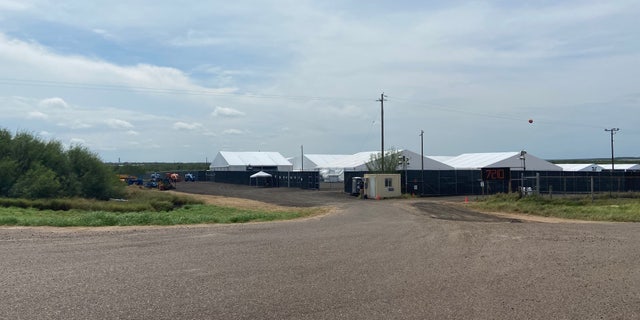Texas city's resources strained following Del Rio migrant surge
Laredo’s resources strained from migrant surge
To assist with processing the 15,000 Haitian migrants that came through Del Rio, Customs and Border Protection built a 100,000 square foot tent in Laredo, Texas — about 180 miles from Del Rio. Small towns like Del Rio don’t have the resources to process them, so they bus them to mid-sized areas like Laredo. Once they’re processed in Laredo, they’re bused out to even bigger cities like Houston and Dallas. The Laredo city manager says they don’t have the resources (financial, medical, human) for another surge, but they will do the best they can. The police department is also strained as they deal with the consequences of illegal immigration like busting stash houses and human smuggling.
LAREDO, TEXAS – Some of the 15,000 Haitian migrants who arrived in Del Rio two weeks ago are still being processed in other Texas cities.
One of those cities is Laredo, where Customs and Border Protection put up a temporary facility to deal with the large number of illegal immigrants coming in. It’s a 100,000 square-foot tent meant to give CBP more space to process the immigrants.
But the burden is also falling on the local government and law enforcement, who say they’re low on resources.
“All eyes are on the border,” said Robert Eads, Laredo’s city manager.
Border towns like Laredo face the challenges of the immigration crisis daily. Hundreds of people, sometimes over a thousand, come in every day.
Eads says it’s straining their resources.
Laredo, Texas, is situated along the U.S.-Mexico border. It’s about 180 miles from Del Rio.
“What we’re going to have to do is take resources from our community that will have to apply somewhere else,” Eads said. “If it’s an EMT, fire department, police department, traffic control, whatever it may be, we’re going to have to suspend that so we can address this.”
In August, the city of Laredo began busing migrants to bigger cities like Austin, Dallas and Houston, which have more hospital capacity. This was at the cost of the city and taxpayers — about $6,000-$8,000 a day.
“Our health system cannot support those volumes,” Eads said. “Even if a migrant themselves, God forbid, gets sick, it’s the same resource that we’re going to lack, so they may not get the services that they need.”
Some of the Haitian migrants who passed through Del Rio in mid-September are still being processed at a temporary facility in Laredo.
The soft-sided tent is about 180 miles from where the migrants first crossed the border.
Customs and Border Protection opened a temporary facility in Laredo, Texas, to help process migrants. It is 100,000 square feet. (Ashley Soriano/Fox News)
Del Rio, with a population of around 35,000, doesn’t have the resources to process that many people.
“It’s important to keep in mind that this is not a detention center, not meant for long-term custody. It’s not designed to hold criminal aliens, and it’s not a jail,” said Chief Matthew Hudak, Laredo sector Border Patrol chief, in a press release.
CBP will provide meals, hygiene care and laundry services.
According to CBP, it has 36 individual showers, a holding area, sinks and restrooms, 34 workstations and a TV for entertainment.
“It is really a temporary facility to allow us the space that we need to process the people that we bring in and then move them on to the rest of the process down the line,” Chief Hudak said.
The migrants will be bused out to bigger cities, this time funded by the federal government.
The city manager says their processing capacity is 200 to 300 people per day, but the tent facility is seeing about 1,200 a day.
“It’s quicker to drive or bus migrants from Del Rio, Texas, three or four hours and get them to Laredo because we then process them within the time period that they need … (Del Rio) just doesn’t have it (resources),” Eads said.
Migrants have also been flown out of the Laredo International Airport.
Also, a result of the Del Rio migrant surge, some Border Patrol checkpoints were closed so that personnel could be reassigned to help process the migrants.
Eads says that in his 49 years of life, he has never heard of or seen that happen.
Meanwhile, the Laredo Police Department’s biggest concern when it comes to illegal immigration is human smuggling.
“We have stash houses that are popping up everywhere,” said Investigator Joe Baeza, LPD’s public information office. “In one particular house we had close to 100 people. Three bathrooms for 100 people. It’s going to be messy.”
LPD has responded to 121 calls relating to stash houses so far this year.
“The department always has its hands full but more so now with these issues related to immigration,” Inv. Baeza said.
The city is asking the federal government for funding to buy more buses and hire additional personnel in preparation of another potential surge.
Source: Read Full Article



